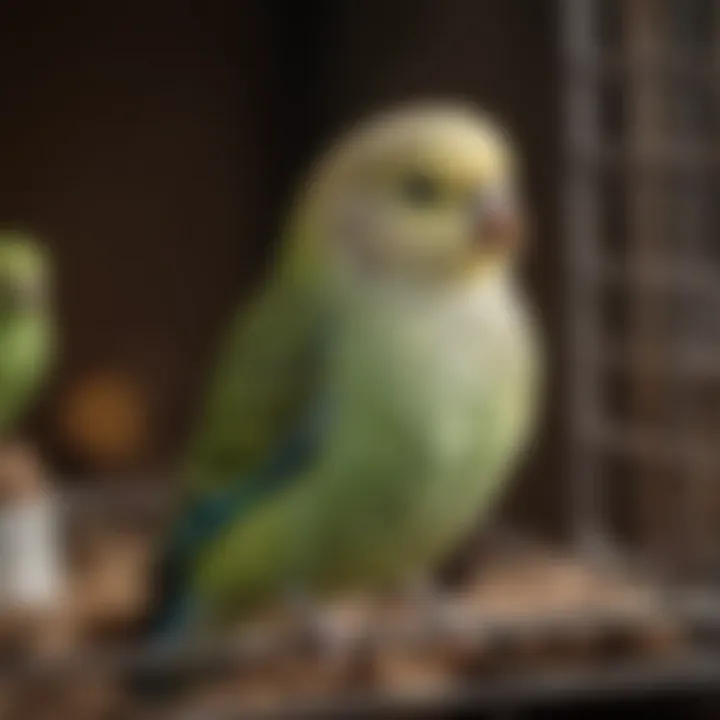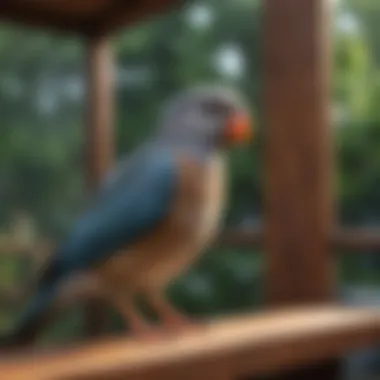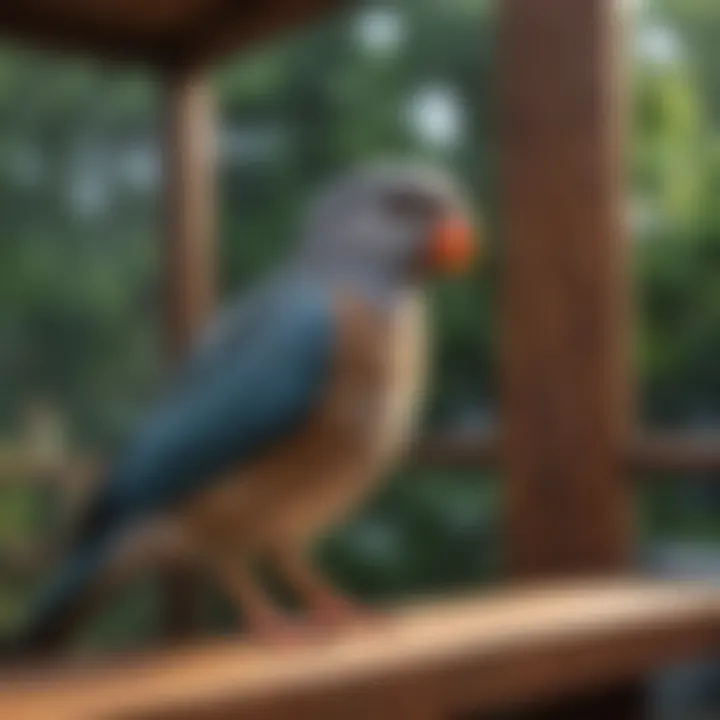Top Quiet Bird Species for a Peaceful Home


Intro
Finding the right pet bird can sometimes feel like searching for a needle in a haystack, especially when you value tranquility at home. Not every feathered friend is cut from the same cloth—some sing sweet melodies, while others communicate with mere whispers. This article explores quiet pet bird species that can harmoniously coexist with peaceful living environments. From their unique care needs to socialization habits, we've covered what you need to keep your avian companion happy and at ease. Let's wing our way into the essentials of avian care.
Avian Care Basics
Importance of Proper Nutrition
A well-fed bird is a happy bird, that's for sure. Nutrition plays a significant role in the overall health of your pet bird. Most birds thrive on a balanced diet that includes high-quality pellets, fresh fruits, and leafy greens. However, not all birds have the same dietary needs. For example, budgies benefit from seeds and greens, while canaries might fancy a more specialized blend. Monitor your bird's meals closely to ensure they’re fuelin' their body with the right stuff, as inadequate nutrition can lead to health problems down the line.
Understanding Bird Species and Their Needs
You don’t buy a fish tank and expect to keep cats, right? Similarly, knowing your bird species is crucial. Each bird has unique characteristics that dictate how they should be cared for. While some birds, like parakeets, are generally social and enjoy a lot of interaction, others, such as finches, may prefer a quieter environment. Understanding these behaviors helps create a nurturing space that suits yourbird and maximizes their comfort.
Basics of Birds Habitat Setup
Creating a cozy home for your feathered companion isn’t rocket science, but it does require attention to detail. The size of the cage, the type of perches, toys, and the overall layout can immensely impact a bird’s well-being. The cage should offer sufficient room for movement, and adding a few playful toys helps keep boredom at bay. Also, ensure that the enclosure is placed in an area free from drafts and direct sunlight to maintain a comfortable climate.
Grooming and Hygiene Tips
Birds are not only charming companions; they also require some regular TLC. Keeping their feathers clean not only maintains their health, but it also benefits their mood. This includes regularly bathing your bird, which can be accomplished with a shallow dish of water. Additionally, trim their nails as needed and check for any signs of mites or other pests that may cause discomfort.
Maintaining proper hygiene is essential to ensure both the health of your bird and the cleanliness of your home.
Interacting with Your Pet Bird
Building Trust and Connection
Communication is a two-way street, especially in the avian world. Establishing trust between you and your bird is crucial for a fulfilling relationship. Start slow—spend time near their cage, offer treats, and speak softly to them. Over time, they’ll become more comfortable around you, and this will make the interaction more enjoyable for both parties.
Training Techniques and Tips
Training can be a joy, provided you have the right techniques under your wing. Positive reinforcement works wonders here. For instance, reward your bird with a treat every time they successfully mimic a sound or step onto your hand. This builds a foundation of teamwork and respect that lasts a lifetime.
Fun Activities for Bird Owners and Their Birds
Engaging activities make life sweeter for both you and your pet bird. Try creating simple obstacle courses or letting them explore safe spaces in your home with supervision. Even simple games like hide-and-seek can be a hoot. Remember, a stimulated bird is a happy bird!
Recognizing Bird Cues and Behaviors
Birds communicate in various ways—some subtle, some not so much. If your bird is ruffled up or staying quiet, it might signify stress. On the other hand, chirping can mean they’re happy or trying to chat. Getting to know your bird’s unique cues helps you provide a more responsive environment.
Emotional Well-Being of Birds
The Role of Play and Socialization
Birds are social creatures. They require social interaction and stimulation. Playing with them is more than just fun; it strengthens the bond between you. Providing playtime with toys or other birds can keep their spirits high.
Enhancing Birds' Emotional Health
Just like us, birds need care for their emotional well-being. Ensure they have spaces to fellowship with you or even their feathered peers. Adding mirrors or varied toys can also help. A well-rounded routine keeps their spirits soaring.
Assessing Bird Stress and Remedies
These little creatures can get stressed too. Recognizing the signs—like excessive screeching or feather plucking—means sooner intervention. Create a calm environment and consider calming solutions like soothing music or gentle interactions to lower their stress levels.
Building Strong Human-Bird Bonds
A fantastic relationship with your bird translates to a happy home. Spend time with them daily, talk at them, and observe their behaviors. The more you engage, the better relationship you forge with your feathery friend.
Bird Health and Safety
Common Health Issues and Prevention
While birds are generally hardy, they can face their share of issues. Some common problems include respiratory issues and feather plucking, largely linked to stress or poor living conditions. Regular vet check-ups can go a long way in preventing these problems.
Routine Veterinary Care
Just like you wouldn’t skip your own doctor’s appointment, don’t neglect your bird's health either. Ensure a regular check-up schedule to monitor their well-being and address any potential health issues.
Environmental Hazards to Avoid
Birds are sensitive creatures and can be affected by various environmental toxins. Be cautious of fumes from cooking or cleaning agents. Ensure your bird’s environment is free from hazardous items, like non-stick pans or toxic plants.
Signs of Illness or Distress
Some signs indicate a bird is unwell—such as changes in eating habits, fluffed feathers, or reluctance to engage in normal activities. Early detection is key. If you notice something off, don't hesitate to consult with a veterinarian.
Fun Facts and Quirky Insights
Unique Traits of Popular Bird Species
Did you know some birds can live for decades? African Grey parrots are known for their impressive intelligence, often demonstrating abilities akin to a dog. These little wonders will surprise you!
Historical and Cultural Significance of Birds


Birds have held significant roles in various cultures. In many ancient civilizations, birds symbolized freedom and communication between the earth and sky. Learning about their roles adds depth to how we interact with these creatures today.
Famous Bird Owners and Their Stories
Several notable figures have been passionate bird owners. From Amy Winehouse with her love for pet birds to Mark Twain who enjoyed company of parrots, these tales showcase the bond between humans and these extraordinary creatures.
Preamble to Quiet Pet Birds
When it comes to choosing a companion animal, particularly for those who appreciate a peaceful atmosphere, quiet pet birds stand out. Many people desire the joy of avian companionship but don't want to deal with the potential noise and disruption that can come with it. This section unpacks why selecting quiet birds is key for harmonious living, particularly in small homes or apartments where sound travel can intensify and lead to chaos.
Understanding the Importance of Quietness
In our fast-paced world, tranquility can seem like a rare gem. Many homeowners face the challenge of balancing their love for animals with the need for a serene environment. Quiet pet birds can fill that role perfectly. They offer companionship and beauty without the overbearing squawking or screeching that can be associated with some bird species.
Owning a bird that maintains a soft demeanor can lead to a more peaceful living experience. This inclination toward quieter species may also stem from the awareness that excessive noise can lead not just to frustration, but also heighten stress levels among both pets and owners. Furthermore, calm surroundings tend to improve focus and well-being, which can positively impact social interactions and personal relaxation time.
Pet Birds and Home Environments
The dynamics of a home environment play a pivotal role in shaping the experience of pet ownership. For individuals living in urban settings, apartments with thin walls, or simply those who value a serene space, quiet birds can be a match made in heaven. These gentle creatures can thrive with the right conditions and add vibrancy to a home without the traditionally loud nature of their avian counterparts.
In a cozy nook of one’s living room or a sunlit corner of the kitchen, a quiet bird can nestle into the fabric of day-to-day life seamlessly. They often form profound bonds with their caretakers, enriching the household atmosphere while respecting the tranquil ambiance desired by their owners.
By considering the intersection of bird behavior and home acoustics, one can create a harmonious balance, ensuring that both the human and avian residents enjoy each other's company without added stress. Choosing quiet birds means considering their natural tendencies as well as the unique features of one’s living environment, ultimately leading to a more satisfying pet ownership experience.
Characteristics of Quiet Birds
Understanding the characteristics of quiet birds is key for anyone considering adding a feathered friend to a serene environment. These birds offer companionship without the cacophony that some species are infamous for. Recognizing these traits not only enriches the pet ownership experience but also fosters harmony between the bird and its home.
Birds rank among nature's most delightful companions, and selecting those with quiet dispositions helps ensure that their presence contributes positively to a tranquil living space. Maintaining inner peace becomes manageable, and the dynamics of daily life stay undisturbed when the chirps and whistles are more melodious than thunderous.
Vocalization Patterns
When it comes to vocalization, quiet birds are often more subdued, producing sounds that are gentle on the ears. For instance, Budgerigars, commonly known as budgies, usually engage in soft, melodic chirps rather than loud squawks. Their vocalization typically peaks during play and interaction but even then, it remains within a low volume range.
"Gentle songs, like whispers, can soothe the mind and heart."
Some aspects of vocalization to consider include:
- Frequency of Sounds: Quiet birds tend to vocalize less often than more boisterous species. A Canary might sing joyfully, but this is often for short bursts throughout the day, while a Lovebird may emit soft cooing sounds more frequently without the high pitch.
- Type of Sounds: While some birds might mimic human speech or noises, quiet birds typically stick to simpler sounds, which can be refreshing in a peaceful home. Knowing exactly what each species offers can help tailor your expectations about their vocal engagements.
- Factors Influencing Vocalization: Environmental elements such as social interaction, cage setup, and even time of day can dictate when and how much a bird decides to vocalize. For example, a Finch may be more vocal when feeling secure in a well-structured habitat, while a stressed or unwell bird may not sing at all.
With this understanding, bird owners can foster an atmosphere that maintains a soothing ambiance, steering clear of unnecessary noise that may disrupt the calm.
Behavioral Traits
The behavioral characteristics of quiet birds often play a significant role in their compatibility with peaceful homes. More often than not, these traits complement their subtle vocalizations. A quiet bird's disposition can reveal how they interact with their environment and their caregivers, proving essential for those seeking a serene companionship.
Key behavioral traits include:
- Calmness: Birds like Finches are known for their serene demeanor. They often engage in gentle activities such as preening or nibbling at food rather than displaying overly energetic or anxious behavior, allowing for a peaceful cohabitation.
- Social Structure: Many quiet birds are social but not demanding. For instance, while Lovebirds seek companionship, their need for interaction is not overwhelming, which allows the owner space to breathe and enjoy each other’s company without the loud squawking that some larger species may require.
- Exploration Tendencies: Quiet birds tend to be less prone to disruptive behaviors. A Canary, for example, may relish exploring its space without excessive fuss, making it a fitting addition to a serene household. Their exploration becomes a gentle pastime rather than a source of chaos.
In sum, the characteristics of quiet birds offer a wealth of benefits. Understanding their vocalization patterns and behavioral traits enables prospective bird owners to choose wisely. The right bird can truly transform a residence into a harmonious haven, rife with gentle companionship while keeping the bustling world at bay.
Popular Quiet Bird Species
When considering a pet bird for a tranquil abode, it's not just about selecting one that’s charming and cute. The right species should also align with your lifestyle and the serene atmosphere you aim to maintain. Different birds come with their own unique characteristics, habits, and temperaments. Choosing wisely means looking beyond the feathers and into the heart of these creatures.
Budgerigar
Origin and Habitat
Budgerigars, commonly known as budgies, hail from the grasslands of Australia. Their natural habitat plays a big role in shaping their behavior and interaction styles. These little birds thrive in flocks, which speaks volumes about their innate social nature. Choosing a budgie for your home can be beneficial due to their adaptability; they can easily fit into a well-structured environment that mimics their natural vivacity, yet they don’t necessarily need constant raucous interaction. This makes budgies a popular choice—it’s as if they carry a piece of the open outback with them wherever they go.
Social Behavior
Social behavior is a defining trait for budgerigars. They are known for their engaging personalities and they often bond closely with their human counterparts. A key feature of budgie behavior is their playful antics; they can be lively and entertaining while keeping noise levels in check. Even in smaller spaces, they adapt remarkably well, often forming lively dialogues without becoming overly loud. It’s worth noting, though, a solitary budgie might develop behavioral quirks due to loneliness, leading to the idea of getting a pair for companionship – which balances noise and social needs.
Care Requirements
Care requirements for budgerigars are moderate, making them manageable even for new bird owners. They need a decent-sized cage with proper perches and toys to stimulate their minds. Regular dietary needs include a well-balanced seed mix, supplemented with fresh vegetables and occasional fruits. One significant aspect is their exercise; allowing time outside of their cage enriches their lives and promotes good health. The ease of care, together with their charming personalities, often puts them at the top of the list for people seeking quiet companionship.
Canary
Types of Canaries
Canaries are not just serenading singers; they come in diverse varieties, each with distinct colors and song styles. From the bright yellow rollers to the more subdued hues of the gloster, each type adds a unique charm. Their beautiful plumage and soft voices make them appealing for those desiring both aesthetics and tranquility. The gentle trill of a canary can be surprisingly calming, with many types being relatively quiet compared to other birds, solidifying their spot in the category of ideal home birds.
Health Considerations
Keeping canaries healthy is crucial for their longevity. They are quite resilient but can be prone to diseases if not cared for properly. Regular check-ups, a nutritious diet, and proper living conditions can mitigate health issues significantly. It's essential to be aware of common ailments, such as respiratory issues, which can stem from poor ventilation. Therefore, knowing how to maintain a clean and safe environment is of utmost importance for a canary owner looking for a low-maintenance pet bird.
Living Environment
Canaries thrive in spacious cages that allow for flying short distances. The design of their habitat can greatly influence their well-being. Having natural materials for perches, a place for bathing, and some toys for interaction can promote a healthy lifestyle. They prefer quiet areas, away from excessive hustle and bustle. Such arrangements create a soothing ambiance for both the birds and their owners, ensuring a peaceful coexistence.
Finch
Species Overview


Finches are fascinating little birds, known for their striking colors and friendly temperaments. They come in numerous species, each bringing their own unique flair to a home. Unlike some birds that require extensive social interaction, finches can enjoy a more independent lifestyle, making them ideal for those who need quieter pets that still bring life to a home without constant chatter.
Dietary Needs
The diet for finches primarily consists of seeds, with a variety of grains and greens to keep things balanced. They thrive on a seed mix tailored for their specific species, which can be supplemented with fresh foods such as leafy greens. While easy to feed, ensuring they're eating properly can keep health problems at bay. It’s a relatively low-maintenance diet, allowing owners to focus more on creating a serene environment.
Breeding Behaviors
Breeding finches can be a delightful process, yet it comes with responsibilities. They are known to breed readily under the right conditions. Providing appropriate nesting materials and a peaceful environment can lead to successful breeding, but it can also create noise during mating and feeding times. If owners are seeking a quiet space, it's worth considering whether to breed or simply enjoy them as happy, non-breeding companions.
Parakeet
Variations of Parakeets
Parakeets are often characterized by their vibrant colors and lively dispositions. With many variations, they cater to different aesthetics and preferences. The most familiar is the budgerigar, but there are many species like the English budgie and Indian parakeet. Each variation provides a unique personality and appearance which can suit different home environments. The key here is to find a species that aligns with your desire for companionship without much ruckus.
Interaction with Owners
These birds are known for forming strong bonds with their humans. While parakeets have a social nature, they can also respect a peaceful environment. They enjoy interaction but can communicate through singing melodically rather than squawking loudly. This balance of sociability and quietness often makes them a favored choice for homes wanting harmony. It's essential to spend time engaging with them to enrich their lives without overwhelming them with noise.
Cage Setup
The setup for a parakeet's cage should reflect their needs for both social interaction and seclusion. A spacious cage with vertical space—allowing for climbing and flying—is ideal. Including natural perches and various toys keeps their environment stimulating yet calm. Ensuring the cage is equipped for their needs can lead to a satisfying life for both the bird and you, enhancing the peaceful atmosphere of your home.
Lovebird
Bonding with Lovebirds
Lovebirds are known for their affectionate nature, forging strong bonds with their human caregivers. Their loyalty can be both a reward and a challenge. While their love for interacting can enhance the home environment, it can lead them to become overly demanding. Early in ownership, establishing boundaries can help build a developing relationship that respects your need for tranquility yet fulfills their social cravings.
Housing Arrangements
Lovebirds thrive in pair bonds, so it might be best to house them in couples if one desires to keep the harmony intact. They appreciate rooms where they can interact safely, but it’s essential to ensure they have their own private spaces when they need to unwind. Observing their social structures can help set up an optimal living arrangement, promoting a peaceful existence.
Diet Preferences
The diet for lovebirds also requires attention, focusing on balanced seed mixes and the addition of fruits and vegetables. Their health relies heavily on nutrition which can influence their energy levels and sociability. A proper diet contributes to their calm demeanor, ensuring they remain the gentle companions their name suggests.
By understanding each species and their unique traits, prospective owners can significantly improve their chances of a rewarding and peaceful bird-keeping experience.
Considerations for Quiet Bird Ownership
When considering quiet pet birds for your home, it's crucial to delve into several key factors that influence both the well-being of the birds and the peace of the household. Owning a pet involves more than just the joy they bring; it also entails a profound responsibility. Quiet birds can be enchanting companions, but their specific needs must be addressed to ensure a harmonious coexistence.
Space Requirements
Space is often at the top of the list when it comes to welcoming a feathered friend into your home. These creatures, while they might not be as demanding as a dog, still require adequate room to move, exercise, and thrive. Adequate spacing contributes to their overall mental and physical health. Many people assume that a small cage suffices for a bird, but this can lead to a myriad of issues, including stress and behavioral problems.
If you are looking at parrots, for example, they often need a cage that's much larger than commonly presumed. A parakeet may require minimal space, but providing room to fly can benefit their health tremendously. Even smaller birds, like canaries or finches, thrive better with spacious environments, allowing them to engage in natural behaviors such as flapping wings or hopping about.
"It's well-known that a happy bird makes for a happier home."
Social Needs
Birds are social animals, and this characteristic plays a major role in their happiness and health. Contrary to the belief that quiet species are more independent, many need consistent interaction with their owners or other birds. Neglecting this aspect can lead to loneliness, which in turn spurs unwanted behaviors or health deficiencies.
Consider the following points regarding social needs:
- Interaction with Other Birds: If multiple birds are kept, ensuring compatibility is essential. Birds like lovebirds thrive in pairs or small groups and get easily stressed without company.
- Human Interaction: Some species, like budgerigars, often become quite attached to their owners. Daily chats, training sessions, or just simple companionship can prevent them from becoming anxious or unwell.
- Daily Routine: Birds flourish under routine. Set times for interaction, feeding, and playtime offer them structure, reducing feelings of anxiety or uncertainty.
Health Care and Maintenance
Keeping a quiet bird goes hand in hand with maintaining their health through proper care techniques. Unlike cats or dogs, birds often hide their illnesses well; thus, you will need to be observant and proactive. Regular check-ups with an avian vet should be prioritized, and being informed about common health risks of the species you choose is critical.
In addition to vet visits, the following are significant aspects of bird care:
- Nutrition: Each species has its dietary preferences and needs. Ensure a balanced diet that suits their species, including fruits, seeds, and pellets.
- Hygiene: Be prepared to clean their cage often. A dirty environment can lead to a host of health issues, including respiratory problems.
- Mental Stimulation: Birds are intelligent creatures that need mental challenges. Offering toys, puzzles, and interaction can keep them engaged and healthy.
In essence, engaging with these considerations enables you to foster an environment where both you and the birds share a tranquil existence. This results not only in a peaceful home but also in a flourishing bond between you and your avian companions.
Enhancing Peaceful Coexistence
Creating a harmonious living situation is a key aspect of owning quiet pet birds. Ensuring that both the birds and their owners feel comfortable is vital. When a bird's environment is tailored to its needs, it contributes significantly to the overall tranquility of the home. A well-thought-out setup can help mitigate common issues, making for a more serene atmosphere.
Optimal Cage Conditions
The cage is the bird's sanctuary. It's crucial to select an appropriate size, as cramped quarters can lead to stress—not just for the bird but for the owner as well. Most small birds need a cage that allows them to move freely without feeling restricted.
- Size: A general guideline is to provide at least two times the wingspan of the bird in length and height. This allows room for comfortable movement.
- Bar spacing: Ensure the spacing between bars is wide enough for their comfort but narrow enough to prevent escape.
- Layout: Arrange perches at different heights to promote activity. Include a variety of materials to prevent foot problems.
- Cleaning: Choose cages that are easy to maintain, since a tidy environment minimizes diseases and odors.
These factors play a huge role in sustaining a peaceful coexistence.
Creating a Safe Environment
Safety cannot be over-emphasized when it comes to pet ownership. A few pointers can significantly reduce hazards:
- Location: Place the cage in a quiet, low-traffic area of the home, away from direct sunlight and drafts. This reduces stress on the birds and keeps them healthy.
- Toxic Plants and Substances: Familiarize yourself with common household plants that are toxic to birds, like philodendron or pothos. Store cleaning supplies securely.
- Small Objects: Remove any tiny items that birds can ingest. Birds are curious and will investigate everything, which can lead to choking hazards.


"The essential nature of a safe dwelling can't be overstated; peace of mind is as important for birds as it is for their human companions."
Stimulation and Enrichment
Birds are intelligent creatures that require mental and physical stimulation to thrive. Without it, they can become bored and even withdrawn. Here are some effective strategies:
- Toys: Offer a range of toys—chewing, swinging, and puzzle types. Rotate them regularly to keep the excitement alive.
- Foraging Opportunities: Mimic their natural behavior by hiding treats in toys or around their cage, making them work for their food.
- Interaction: Spend time talking to your birds. This not only enriches their lives but helps to build the bond between you.
In essence, a thoughtfully designed environment incorporates elements that promote overall well-being and peace, making for a pleasant atmosphere. By taking these considerations seriously, pet bird owners can foster a serene living space that benefits everyone involved.
The Emotional Bond Between Bird and Owner
The connection between a pet bird and its owner is a relationship full of mutual understanding and affection, serving as an essential aspect for bird enthusiasts. Birds are more than just colorful companions; they possess unique personalities that can resonate with their human counterparts. Understanding this bond is crucial for ensuring a harmonious home environment, particularly when fostering a space where both the bird and owner can thrive. A well-established emotional connection can lead to a happy, healthier bird and a fulfilling experience for the owner.
Understanding Bird Behavior
Grasping the nuances of bird behavior is the foundation of building a close relationship with your avian companion. Birds communicate non-verbally through body language, vocalizations, and habits. For instance, a relaxed bird will often have a calm posture, while a frightened one might puff up or retreat to a corner. Similarly, specific sounds can indicate a bird's mood. A gentle chirp might express contentment, while incessant squawking may suggest distress or boredom.
"Birds challenge our perceptions of companionship; they remind us that connection can exist even without a shared verbal language"
Observing your bird's behavior over time helps you learn what makes it comfortable and what might stress it out. Adjustments in their environment, such as providing safe spaces or engaging with them during quiet moments, can greatly enhance their overall well-being. Not to mention, understanding these behaviors enables owners to respond appropriately, fostering an even deeper emotional bond.
Building Trust
Trust is a fragile flower that needs nurturing. Establishing it may take time, especially with shy or timid birds. The journey begins by offering a consistent routine, which birds find reassuring. Regular feeding times, for example, allow them to anticipate their owner's presence, gradually reducing anxiety around their human. Also, utilizing gentle vocal tones and soft words during interaction can promote a calmer atmosphere.
Physical contact can also play a major role in building trust. Allowing your bird to approach on its own terms is a crucial element. Gradually, you might introduce them to your hands or fingers, treating these interactions like a gentle dance rather than a forceful command. Hand-feeding your bird some preferred snacks fosters a positive association with you as a provider of good things.
To summarize, the emotional bond between a bird and its owner enriches both lives. From understanding behavior to building trustworthy interactions, each aspect contributes to a fulfilling companionship. This bond not only aids in communication but also plays a vital role in keeping the home peaceful and joyful.
Challenges of Quiet Bird Ownership
When considering the prospect of welcoming a quiet bird into your home, it’s important to recognize that even the most serene species can present their own set of challenges. Understanding these potential hurdles is vital for creating a harmonious environment for both the bird and its human companions. In this section, we look at the intricacies of quiet bird ownership, diving into distinct behavioral issues and health risks that may arise, further emphasizing the necessity of informed commitment before taking the plunge into avian companionship.
Potential Behavioral Issues
It's a common misconception that quiet birds are completely free from behavioral quirks. While they might not be as vocal as other pet birds, they certainly have their own personalities, which can sometimes lead to issues in your living space. Here are a few behavioral concerns that owners might experience:
- Social Withdrawal: Quiet birds might not be the most naturally social creatures. Species like Canaries and Finches can sometimes avoid interaction if they feel overwhelmed. A shy bird may require gentle encouragement to engage with its owner or other pets in the household.
- Boredom: Birds require mental stimulation, and without it, they can develop restlessness. Finch or Parakeet owners might notice their pets plucking feathers or excessive pacing if they lack adequate toys or social interaction.
- Aggression: In certain situations, a quiet bird can exhibit aggressive behaviors, especially if it feels threatened or cornered. It’s necessary to observe body language to understand when your bird is in distress or needs space.
Adapting to these behavioral challenges often necessitates patience and gradual training. Instead of simply avoiding noise, potential owners should equip themselves with strategies and environments conducive to fostering a healthier bird mentality.
Health Risks in Quiet Birds
Just like their more vocal counterparts, quiet pet birds can also be susceptible to a variety of health issues, which can often go unnoticed due to their subtlety. Monitoring the health of your feathered friend is essential:
- Obesity: Quiet birds may lead a sedentary lifestyle if not provided with adequate space to fly and explore. This can result in obesity, which opens the door to various health problems such as heart disease. Owners should ensure their bird has plenty of room to move about and the right diet to maintain a healthy weight.
- Respiratory Issues: Many birds, including Canaries and Budgerigars, can be sensitive to environmental triggers like smoke or strong chemical scents. Poor ventilation and exposure to dust can lead to respiratory problems which, if overlooked, might escalate into more severe conditions.
- Ailments from Stress: Birds are generally sensitive creatures. A quiet bird in a stress-inducing environment—whether due to loud noises or aggressive pets—might develop anxiety-related health issues. Physical symptoms can range from frequent feather loss to changes in eating habits.
Choosing the Right Bird for Your Home
When considering bringing a feathered friend into your serene abode, the process of choosing the right bird for your home becomes a pivotal step. Not only does each bird bring unique characteristics, but they also have varying needs that align differently with your living situation and lifestyle. Selecting the perfect pet bird can lead to years of delightful companionship, while the wrong choice may result in frustration on both ends.
One must consider multiple factors, especially since peaceful homes require an environment where both the bird and the owner can thrive mutually. Understanding what the bird needs, and whether your living arrangements can meet those needs, is key to ensuring a harmonious relationship. Furthermore, recognizing the personality and behavior of different bird species can greatly influence your choice. The objective here is to find a bird that fits comfortably into your lifestyle and living space, supporting both their well-being and your peace of mind.
Assessing Your Living Space
When it comes to assessing your living space, several details come into play. A small apartment might be home to a calm canary, whereas those with larger homes might consider welcoming a gallant budgerigar.
Here's what to evaluate:
- Space Availability: Does your home provide adequate living space for the bird's cage? Birds, even quiet ones, need room to move around, and their cages should reflect this need for both comfort and safety.
- Environmental Factors: Consider the lighting and temperature in your home. Natural light is essential for birds, coupled with a moderate temperature that isn't too drafts or extreme heat.
- Quiet Areas: Locate a place that's free from foot traffic and noise to give your bird sanctuary away from the bustle of daily life. Birds thrive best in environments that aren’t overly stimulating.
- Access to Care: Position the cage near areas of your home where you spend most of your time. This arrangement allows for constant interaction and makes it easier to provide necessary care.
In considering the above aspects, think about how much effort you can commit to establishing a suitable habitat for your avian companion. If the set-up is lacking in these critical areas, it may be worth reassessing your decision before bringing a new bird into the mix.
Evaluating Personal Lifestyle
Your lifestyle will heavily influence the choice of bird that fits well within your life. Not every quiet bird is suited to all personalities or schedules. Here are some key lifestyle factors to ponder:
- Daily Routine: How many hours a day do you spend at home? Birds need some form of social interaction to stay healthy, so if you are often away, consider species that engage themselves easily or are more independent.
- Level of Activity: Some birds are naturally more energetic, even if they are quiet. If you're more laid-back and enjoy peaceful evenings, a calm lovebird might be better suited than a lively parakeet.
- Family Dynamics: If you have children or other pets, think about how a new bird will interact. Does the bird's temperament fit within your family's activity levels? A quiet finch may often be more tolerant in a lively household than a timider species.
- Long-Term Commitment: Each bird species varies in life expectancy, with some living for decades. Evaluate whether you're ready for the long haul, considering the time and energy needed for care.
Ultimately, this step is about introducing a new companion who will blend seamlessly into your daily life while simultaneously meeting their unique needs. Considering both the physical layout of your home and your habits will help you select a bird that adds joy—without disrupting your peaceful environment.
"A good relationship with your bird starts with understanding both your own needs and those of your future pet."
Stay tuned as we explore more about quiet pet birds that would fit perfectly into your serene living arrangements.
Closure
When it comes to finding suitable companions for a peaceful home, choosing the right quiet pet birds is of paramount importance. This article has laid out various aspects of bird ownership, detailing how these feathered friends can coexist harmoniously in our spaces. From their soft vocalizations to their captivating behaviors, quiet birds can fit nicely into our lives without causing disruptions.
Summary of Key Points
In summary, several essential elements have been discussed:
- Characteristics of Quiet Birds: Understanding their vocalization patterns and behavioral traits helps to identify which species may suit one’s living environment.
- Popular Species: Birds like the Budgerigar, Canary, Finch, Parakeet, and Lovebird have been highlighted as some of the best choices for tranquility. Each has unique care requirements and social needs.
- Considerations for Ownership: The need for appropriate space, social interaction, and health care cannot be overstated. Keeping these aspects in mind ensures a happy home for both birds and owners.
- Enhancing Coexistence: Optimal cage conditions and a stimulating environment contribute significantly to the well-being of birds.
- Emotional Bond: The connection between a bird and its owner is crucial. Understanding their behavior and building trust leads to a fulfilling relationship.
- Challenges and Choices: Acknowledging potential drawbacks and making informed choices are key steps for prospective bird owners.
The right quiet pet bird can fill your home with gentle companionship, offering both joy and peace.
Encouragement for Future Owners
For anyone considering inviting a quiet pet bird into their home, now is the time to reflect on why it might be a wonderful addition. Quiet birds can thrive in a variety of living situations. It’s essential to evaluate both your lifestyle and chirpy potential companions. Whether you’re an aspiring bird parent or a seasoned owner searching for tranquility, patience and understanding go a long way in fostering a deep bond.
Engaging with a new bird is not just about companionship; it’s about creating a nurturing environment. As you take this plunge, remember the joy these gentle creatures bring. Their presence can make even the most chaotic life moments a little more serene. Never underestimate the peace that can come from a soft chirp or a gentle nuzzle from your feathered friend.















